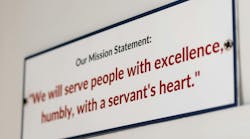Leading can be defined as simply motivating others to behave the way you want. Being the boss may give the ability to dictate others’ behavior, but simply demanding performance will rarely achieve the highest level of success.
Early on in my fast lube days, I had the opportunity to be a sponge and absorb great thoughts and ideas from many operators all across the country. One of those operators was a man named Larry Dahl. Dahl’s philosophy of managing and leadership stands out the most when I think about any secrets to success I know of. His philosophy changed my business and life for the better, and I want to share it with you.
Great leaders become great by serving others. The more people you serve, the higher your position in life will be. This is a profound key to individual and collective success.
Take a moment to think back over your entire life. Recall the person who had you under their control — a boss, teacher, parent, sergeant, etc. — and who you consider to be the best leader of the bunch. Pause for a moment and actually picture that person in your mind before continuing.
I’ll bet that person served you in some way. You were under their control, but they did something for you. They taught you something, gave you confidence, got you past a hurdle or inspired you in some way. Chances are their interest in you was a turning point in the twists and turns of life that helped bring you to where you are today. They were the leader, but they served you. If you chose that individual as the best leader, isn’t it logical to pay it forward and lead by serving the people in your charge today?
Think back through history. Humans naturally follow those who care for us. Who were the most highly regarded presidents? Washington could have been a king, but he cared enough to give us a republic. Lincoln gave freedom. Theodore Roosevelt gave us national parks. Franklin Roosevelt brought us out of the Great Depression and gave us Social Security. Eisenhower brought about the interstate highway system. The common denominator among these leaders is they led by serving. They did something for us.
We still follow religions today that were established more than 2,000 years ago because they offer us ultimate rewards — love, faith and eternal life. Leadership is motivating others to behave in a certain way. Those who founded the world’s religions are undeniably the ultimate leaders, because most all humanity still behaves as directed hundreds of generations later.
The point is, humans respect, admire and will follow those who care for them more readily than those who simply boss because they can. Great leaders become so by serving others.
In every organization there is a pecking order — an organizational chart or chain-of-command. Wherever one appears on the chart they should see it as an opportunity to serve all those below them. In a fast lube, the owner should understand their position at the top carries the duties of providing the training, tools, motivation and environment to enable those below to perform well. It’s an attitude of serving rather than bossing. Care and provide for your crew, and they will care for your customers.
Those in the middle of the chart should perceive serving both up and down. Rather than clawing their way to the top, they should focus on serving those beneath them. Help those above you to accomplish their goals and vacancies are made for you as they advance and pull you up. With all those around you pushing and pulling you upward, advancement is much smoother.
The secret to success for everyone involved is to think outwardly rather than concern for one’s self. The more you focus on others’ well being, the more you’ll evolve into a leader. If you accept the role of a leader is to take care of those in your charge, then it becomes obvious the more you care for others, the more likely you’ll evolve into a position of leadership.
It works in all facets of life. As a parent, do you boss your kids because you can, or do you see your role as a provider and trainer for the next generation? Everyone’s primary job description is to pass on the torch of life in good standing. It’s more important than success, wealth or the car you drive.
In your club or civic group, are your motivations to assist others in accomplishing the group’s goals? Those who think outside themselves as well as outside the box usually advance into leadership positions. Sometimes, listening beats talking, whether it involves sales, negotiations or leading a group.
Having an attitude of service to others doesn’t necessarily mean manning the soup kitchen or ringing a bell during the holiday season — although both are very commendable. It’s the attitude that is important. Telling a waitress she does good work or letting that deputy know you appreciate his service takes no time and costs you nothing, but it may be the spark of motivation they needed.
Think back. Didn’t someone’s simple comment play a part in where you are today? Pay it forward. You may just change someone’s life for the better.
Serving your employees doesn’t mean you should do their laundry, but sincerely caring for their welfare is a requirement of good leadership. Psychologists have something called the pyramid of human needs to which they often refer. It’s also a good guide for those in management to ensure the needs of those they manage are provided.
At the very base of the pyramid are air, water and food. Make sure your crew has an opportunity for food and drink. The next level up is security. For your crew to perform well, they must feel safe and secure. When the brain is concerned with fear, not much else gets done. A feeling of security is enhanced with a pay system that has reliable expectations. Such things as having hours cut when the utility bills are past due will make it difficult for an employee to focus on good customer service. Some things related at this level are long rubber gloves, safety glasses and procedures for accident prevention. A supervisor who manages by intimidation and threats can adversely influence a team’s feeling of security.
Next up are the social issues — the need for love, caring and appreciation by others. This level is where the astute fast lube owner can generate significant results. Be lavish with praise and expressions of appreciation for those who serve you. Tangible rewards such as diplomas, merit raises and social gatherings for special events are means to say, “I care for you and appreciate your efforts.”
The next level is esteem, the quality of feeling good about one’s self. One of the keys to promoting self-esteem is through enhancing the feeling of belonging. When you belongs to a team, family or group and have a role in the success of that team, self-esteem is extremely high. Uniforms, social functions, recognition, competitions and group celebrations strengthen belonging. At team meetings, frequently throw out such questions as, “How can we be more successful?” and “What do you need?” It’s a proven consultant’s ploy you can do yourself. The good ideas your team generates will be performed with a higher level of enthusiasm.
Near the top of the pyramid is self-actualization, being in control of one’s life and accomplishing self-established goals. Yep, feel proud; you’re near the peak.
At the very top is the wonderful human need to give, contribute and pass on to others. Not everyone is a wealthy philanthropist, but caring for others and motivating them can lead to some of the highest satisfactions in life.
Your attitude makes the difference. Are you performing to serve your business, your community, your crew and your customers? The thinking process is readily perceptible by all those around you. When you perceive your role in life is to proactively serve others, others will make you their leader. If those others happen to be customers, they will come, too.
JOE HAGGARD writes from a customer’s point of view and is a retired fast lube consultant. He welcomes comments at 352.861.1985 or via email: [email protected]





